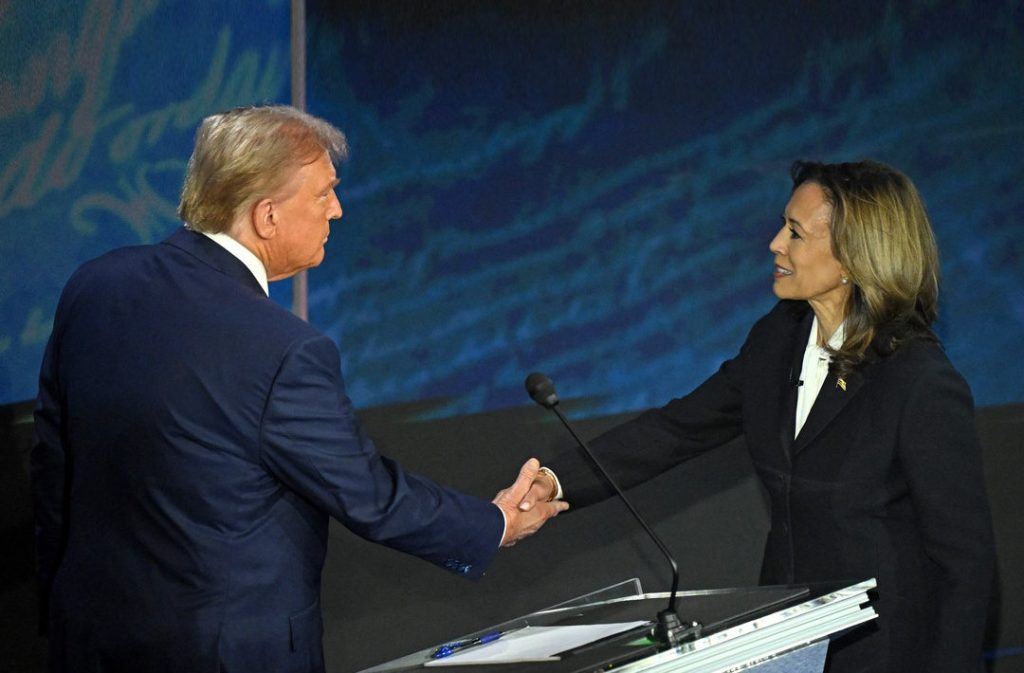The first debate between Kamala Harris and Donald Trump has reignited the political landscape of the 2024 U.S. presidential race, showcasing a close battle between two very different visions for America. For Canadians, this debate is more than just a spectacle—it holds significant implications for the future of Canada’s economy, trade relationships, and even political strategy. With polls showing a nearly 50-50 split in the U.S., the outcome of this election will likely shape Canada’s future as much as it will the United States’. While Harris performed better overall in this debate, Trump’s uncharacteristically subdued performance leaves room for questions about what’s next in the race and what ripple effects Canadians can expect.
As we delve deeper into the key moments of the debate, we’ll explore how the potential outcomes of the 2024 U.S. election could lead to policy shifts that impact Canada. From trade relations and inflation control to military spending and political strategy, Canadian entrepreneurs and citizens alike should be paying close attention. After all, the reverberations of the next U.S. president’s policies will inevitably be felt across the border.
Harris’s Debate Victory: Missed Opportunities on Key Issues
Kamala Harris emerged as the clear winner of the first debate, but her performance wasn’t flawless. While she maintained a strong composure and delivered several well-reasoned points, Harris missed some golden opportunities to drive the narrative home—especially when it came to economic issues like inflation, which is plaguing both the U.S. and Canada. However, her decision to initiate the handshake with Trump at the beginning of the debate sent a clear message of confidence and control, setting the tone early.
The Inflation Conundrum
Harris focused heavily on housing affordability and support for small businesses, but this may have left many Americans—and Canadians—feeling like she avoided the bigger elephant in the room: inflation. In both countries, the cost of living continues to skyrocket, with rising prices on everything from groceries to gas putting significant pressure on middle-class families. Harris’s focus on long-term goals like affordable housing didn’t quite address the immediate concerns of families struggling to keep up with daily expenses.
Canada Connection: Like their American counterparts, Canadian families are also grappling with the cost-of-living crisis, making inflation a pressing issue on both sides of the border. For Canadian entrepreneurs, especially small business owners, this economic pressure is compounded by rising operational costs and dwindling consumer spending power. If Harris is elected and continues to focus on housing affordability rather than immediate inflation relief, Canadian business owners could face further economic uncertainty, especially if the U.S. sets trends for global inflation control measures.
Missed Attacks on Trump’s Economic Record
Harris also missed several opportunities to press Trump on his economic record. During his time as president, Trump had touted his ability to boost the American economy, particularly in the Rust Belt. However, poverty in the region—once his stronghold—remains high, and Harris could have taken advantage of that vulnerability by questioning why Trump’s economic promises didn’t deliver long-term prosperity for working-class Americans.
Canada Connection: Trump’s Rust Belt strategy has parallels to the economic challenges faced by Canada’s manufacturing sectors, particularly in regions reliant on cross-border trade. A Harris presidency may seek to rebuild these relationships and strengthen trade, while a Trump comeback could see a return to protectionist policies, potentially cutting off vital lifelines for Canadian manufacturers.
Trump’s Defensive Stance: A Missed Opportunity for His Signature Performance
For those who tuned in expecting Trump to unleash his usual bravado and commanding presence, reminiscent of his 2016 debate performances against Hillary Clinton, his performance was surprisingly subdued. Rather than capitalizing on moments to put Harris on the defensive, Trump appeared reactive, at times even grumpy, and failed to deliver the knockout blows he’s known for.
Trump’s Missed Attacks on Foreign Policy and Wars
One of the most surprising aspects of Trump’s performance was his failure to hammer Harris on foreign policy—a topic that has been a goldmine for Trump in past debates. He had the perfect setup to critique the Biden-Harris administration for its handling of international conflicts and wars, especially in Ukraine and the Middle East, arguing that these tensions only escalated after he left office. Yet, Trump remained uncharacteristically quiet on this front.
Canada Connection: If Trump were to return to the White House, his likely focus on isolationism and “America first” policies could mean less U.S. involvement in global conflicts. This would have direct implications for Canada, particularly in terms of NATO commitments. Under Trump, Canada would almost certainly face increased pressure to pay a fairer share of NATO expenses, which could lead to higher defense spending and potentially divert funds from domestic priorities like healthcare and education. A Harris presidency, on the other hand, could maintain the status quo, with Canada benefiting from its close military alliance with the U.S. but also facing pressure to support American-led initiatives globally.
Trump’s Lack of Focus on Inflation
Another glaring misstep was Trump’s failure to directly attack Harris on inflation, despite the topic being one of the biggest concerns for both American and Canadian voters. Trump could have easily criticized the Biden-Harris administration for allowing inflation to reach near-record levels, questioning why Democrats failed to take meaningful action when the inflation rate first began to spike.
Canada Connection: Given Canada’s intertwined economic relationship with the U.S., particularly when it comes to inflation trends, Trump’s failure to address this issue could signal a missed opportunity for him to sway not just American voters, but also Canadians who are equally frustrated with rising costs. For Canadian entrepreneurs, a Trump presidency might promise a more aggressive stance on inflation control, though it could come with potential trade-offs, such as reduced cooperation on economic recovery strategies.
What’s Next? Expect a More Aggressive Trump
Given Trump’s below-average performance in this first debate, it’s likely that he’ll come out swinging in the next one. Trump’s ego and his well-known ability to steal the show will probably drive him to recapture the magic of his 2016 debates, where his unpredictability and strong attacks on Hillary Clinton made him the center of attention. Trump thrives in the spotlight, and his supporters expect nothing less than his trademark aggressive style in future debates.
But this subdued Trump has raised questions about whether he still has the stamina and sharpness to keep up with the demands of a U.S. presidency. If his next debate performance doesn’t improve, Trump may find himself being compared to Joe Biden—not in terms of politics, but in terms of perceived aging and capability, which could hurt his chances of regaining the White House. After all, if Trump’s debate performances continue to lag, some voters may start questioning whether he’s still fit for the job.
Canada Connection: For Canadians, Trump’s next debate will be crucial. His policies, particularly on trade and defense, have significant implications for Canada’s economy and global standing. A weakened Trump could mean more volatility for Canadian business owners who rely on a stable and predictable U.S. trade relationship. Conversely, a resurgent Trump could signal the return of America-first policies, potentially leading to higher tariffs and more aggressive trade negotiations with Canada.
How This Debate Shapes Canadian Elections
The political landscape in the U.S. has always had ripple effects on Canada, and this debate is no exception. With a tight race between Justin Trudeau and Pierre Poilievre looming in the next Canadian election, the Harris vs. Trump dynamic could serve as a blueprint for how these Canadian leaders position themselves.
The Trudeau-Harris Parallel
Much like Harris, Trudeau has built his political career on progressive policies, focusing on issues like climate change, social justice, and global engagement. However, just as Harris stumbled by not addressing inflation directly, Trudeau’s government has faced criticism for not doing enough to control Canada’s rising cost of living. If Harris continues to underplay inflation in the U.S., Trudeau may find himself in a similar situation, struggling to convince voters that his policies can provide economic relief.
The Poilievre-Trump Parallel
On the other hand, Poilievre, much like Trump, appeals to populist sentiments and has built a strong base of supporters who are frustrated with the political establishment. If Trump manages to stage a comeback in the next debate and regain momentum, Poilievre may look to replicate his tactics in Canada. This could mean a more combative, confrontational style of campaigning, focusing on economic grievances and government overreach.
Key Takeaways for Canadian Business Owners
- Economic Uncertainty: Both Harris and Trump failed to fully address inflation, leaving questions about how either candidate will handle the economy if elected. Canadian entrepreneurs should prepare for potential ripple effects, particularly in trade and inflation control.
- Trade Relations: Trump’s return could signal a shift back to protectionist policies, which would complicate cross-border trade and potentially hurt Canadian industries reliant on exports to the U.S.
- NATO Commitments: A second Trump presidency would likely mean increased pressure on Canada to pay a larger share of NATO expenses, forcing the government to make difficult budgetary decisions.
- Political Strategy: The Harris-Trump debate dynamic could serve as a preview of what’s to come in the next Canadian election, with Trudeau and Poilievre adopting similar strategies to win over voters.
Conclusion: A Critical Moment for Both Countries
While the first debate between Harris and Trump was far from decisive, it offered important insights into the future direction of both the U.S. and Canada. Harris may have won the debate, but her failure to address inflation mirrors concerns in Canada, where citizens and business owners are looking for leaders who can offer immediate economic relief. As for Trump, his uncharacteristically weak performance raises questions about his ability to reclaim the presidency, but also leaves the door open for a more aggressive, attention-grabbing second debate.
For Canadians, the U.S. election is more than just a distant political contest—it’s a potential game-changer that could influence everything from trade and defense policies to the outcome of Canada’s next election. Whether it’s Harris or Trump, the next U.S. president will play a crucial role in shaping Canada’s future, and Canadian entrepreneurs should be watching closely.







